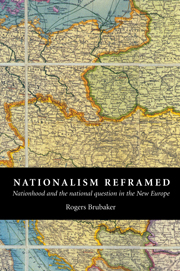Crossref Citations
This Book has been
cited by the following publications. This list is generated based on data provided by Crossref.
1996.
Bibliography.
Canadian Journal of Philosophy Supplementary Volume,
Vol. 22,
Issue. ,
p.
663.
Smith, Graham
and
Wilson, Andrew
1997.
Rethinking Russia's post‐soviet Diaspora: The potential for political mobilisation in eastern Ukraine and north‐east Estonia.
Europe-Asia Studies,
Vol. 49,
Issue. 5,
p.
845.
Delanty, Gerard
1997.
Social exclusion and the new nationalism: European trends and their implications for Ireland.
Innovation: The European Journal of Social Science Research,
Vol. 10,
Issue. 2,
p.
127.
Berezin, Mabel
1997.
Politics and Culture: A Less Fissured Terrain.
Annual Review of Sociology,
Vol. 23,
Issue. 1,
p.
361.
Hargreaves, John
1998.
Ethno–Nationalist Movements in Europe: A Debate.
Nations and Nationalism,
Vol. 4,
Issue. 4,
p.
569.
Cox, Marcus
1998.
The Right to Return Home: International Intervention and Ethnic Cleansing in Bosnia and Herzegovina.
International and Comparative Law Quarterly,
Vol. 47,
Issue. 3,
p.
599.
Smith, Graham
1998.
Russia, multiculturalism and federal justice.
Europe-Asia Studies,
Vol. 50,
Issue. 8,
p.
1393.
Brubaker, Rogers
and
Laitin, David D.
1998.
Ethnic and Nationalist Violence.
Annual Review of Sociology,
Vol. 24,
Issue. 1,
p.
423.
Tolz, Vera
1998.
Forging the nation: National identity and nation building in post‐communist Russia.
Europe-Asia Studies,
Vol. 50,
Issue. 6,
p.
993.
Hann, Chris
1998.
Postsocialist Nationalism: Rediscovering the Past in Southeast Poland.
Slavic Review,
Vol. 57,
Issue. 4,
p.
840.
Torpey, John
1998.
Coming and Going: On the State Monopolization of the Legitimate “Means of Movement”.
Sociological Theory,
Vol. 16,
Issue. 3,
p.
239.
Miller, William L.
White, Stephen
and
Heywood, Paul
1998.
Values and Political Change in Postcommunist Europe.
p.
268.
1998.
Körper der Nation.
p.
342.
Kaufmann, Eric
and
Zimmer, Oliver
1998.
In Search of the Authentic Nation: Landscape and National Identity in Canada and Switzerland.
Nations and Nationalism,
Vol. 4,
Issue. 4,
p.
483.
Hedetoft, Ulf
1998.
Territoriality in the Globalizing Society.
p.
153.
Brubaker, Rogers
1998.
Migrations of Ethnic Unmixing in the “New Europe”.
International Migration Review,
Vol. 32,
Issue. 4,
p.
1047.
Ross, Marc Howard
1998.
Democracy as joint problem solving: Addressing interests and identities in divided societies.
Nationalism and Ethnic Politics,
Vol. 4,
Issue. 4,
p.
19.
Kolstø, Pål
1998.
Anticipating demographic superiority: Kazakh thinking on integration and nation building.
Europe-Asia Studies,
Vol. 50,
Issue. 1,
p.
51.
van Houten, Pieter
1998.
The role of a minority's reference state in ethnic relations.
European Journal of Sociology,
Vol. 39,
Issue. 1,
p.
110.
Bunce, Valerie
1998.
Subversive Institutions: The End of the Soviet State in Comparative Perspective.
Post-Soviet Affairs,
Vol. 14,
Issue. 4,
p.
323.





